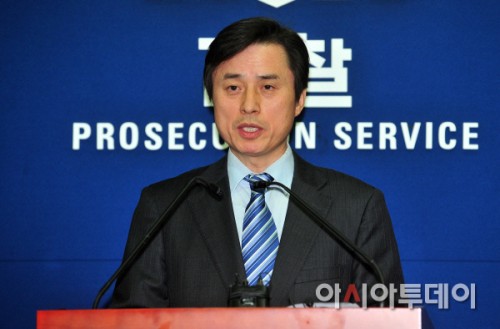 |
| Cho Eun-seok, independent counsel. / Asia Today DB |
A newly revised “super-charged” special prosecutor law has introduced a plea bargaining clause, granting independent counsels the unprecedented authority to reduce sentences in exchange for cooperation. Critics warn the measure—absent from the Criminal Procedure Act and lacking procedural safeguards—gives temporary investigative bodies excessive power.
The amendment, recently passed by the National Assembly, allows defendants to receive reduced sentences if they assist investigations or implicate accomplices. While plea bargaining is routine in the U.S. and other common-law countries, in Korea it is only narrowly allowed under the Capital Markets Act for certain financial crimes. Occasional leniency has been granted in drug cases, but no explicit statute governs the practice.
Proponents argue that in complex financial or large-scale organized crime, insiders’ cooperation is often the only way to uncover the full scope of wrongdoing and hold top leaders accountable. Plea deals could therefore strengthen prosecutorial effectiveness.
But critics stress that victim impact must be considered. Financial and drug cases usually involve fewer or identifiable victims, sometimes complicit in the crimes. By contrast, special prosecutor cases often involve broad, diffuse harm to the public. For example, courts have recognized damages for ordinary citizens harmed by the Dec. 3 martial law declaration. In such contexts, reducing sentences through plea deals could undermine victims’ rights and public confidence in justice.
Despite these concerns, the ruling party pushed through the amendment without significant public debate. Unlike in the U.S., no safeguard was created for judicial review of plea agreements. Observers warn that unchecked powers concentrated in a special counsel risk arbitrary or politically motivated use.
Lim Moo-young, a former prosecutor now practicing law, cautioned: “Allowing prosecutors to strike deals with suspects without judicial approval is highly unlawful and risky. It essentially admits prosecutors lack confidence in their own investigations, pressuring defendants with side charges to secure outcomes. The most potent threat in plea bargaining is to say, ‘we won’t open additional investigations,’ a tactic long criticized as abuse by special investigation units.”
Another criminal lawyer noted the irony: “The ruling party once insisted on separating investigation and indictment powers, yet is now extending prosecutorial reach into sentencing. Negotiating punishments is beyond prosecutors’ legal mandate.” He added that offering leniency to figures like former Army Intelligence Commander Noh Sang-won—considered a key behind-the-scenes actor in the martial law case—simply for cooperation “clashes with the public’s sense of justice. Efficiency alone cannot justify this; thorough legal review and open debate must come first.”
Most Read
-
1
-
2
-
3
-
4
-
5
-
6
-
7





















